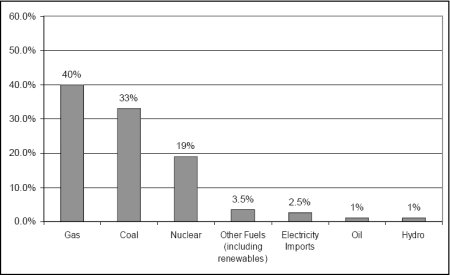According to the UK Independence Party website UKIP will try to achieve the following if they gain power at the 2010 general election:
10.1 Regardless of greenhouse gas emissions, we must cut back on the burning of fossil fuels, as a finite resource that should not be squandered. Use of North Sea gas to generate electricity in the UK over the past decades has been particularly profligate, with about 40% of UK electricity generation now produced from natural gas (see Figure 1). A significant portion of this electricity is then used for heating, a very inefficient process compared to using gas directly for heating. Gas is appropriately used for direct heating but not for base-load electricity generation.

Gas Coal Nuclear Other Fuels Electricity Oil Hydro (including Imports renewables)
Figure 1. Electricity generating sources in the UK by energy output (2004 data)
10.2 Although world oil reserves are not ‘running out’ in the immediate future, global oil production may peak sooner than has sometimes been predicted as ‘easy’ reserves become exhausted. North Sea production is declining rapidly, and UK dependency on imports (gas, oil and coal) makes us vulnerable to interruption of supply, international political pressure, unstable prices and adverse effects on our balance of payments. Even if supplies remain available, costs are likely to rise sharply and Britain could experience drastic energy shortages from as early as 2012.
10.3 Currently we use a higher proportion of gas for electricity generation than elsewhere in the EU. Following the ‘liberalization’ of electricity markets across the EU, the proportion of overall EU electricity generation from gas is expected to rise14. Even allowing for gas supplied from Norway, this makes it even more unlikely that within the EU the UK can rely on secure supplies of natural gas at affordable prices and in the quantity needed in the years ahead.
10.4 Since most of the coal used for electricity generation is now imported, UKIP believes it is time to consider reviving parts of the British deep-mine coal industry, provided that this can be achieved at reasonable cost. New efficient, high-technology extraction methods for exploiting our coal reserves need to be encouraged.
UKIP would therefore support the construction and on-going development of modern high-temperature high-efficiency coal-fired power generation plant (such as pulverisedfuel plant, circulating fluidized-bed combustion plant, or integrated gasification combined-cycle plant). ‘Carbon capture’ (carbon sequestration) at power stations might ultimately provide a possible solution to the issue of emissions from the use of coal for electricity generation. We would consider grant support for such capital works.
10.5 Wind generators, whether onshore or offshore, are not competitive in terms of net energy yield when account is taken of the resources involved in construction, maintenance and decommissioning. They depend for their generating power on being connected to the electricity grid at all times, whilst the intermittent nature of the wind means that other power generation capacity has to be kept running to avoid system instability and to make up for the loss of generation when wind speed is either too high or too low. They are harmful in a number of ways, including being visually intrusive and noisy. They may also require additional electricity pylons to take their output to population centres, such as the highly destructive 137 mile Beauly to Denny line proposed by Scottish and Southern Energy, which could ruin many areas of natural beauty in the Scottish Highlands with 600 pylons, and UKIP opposes the scheme.
I would be interested to hear both positive and negative views on UK Independence Party’s The Need for New Thinking about Energy policies in the comments below?












